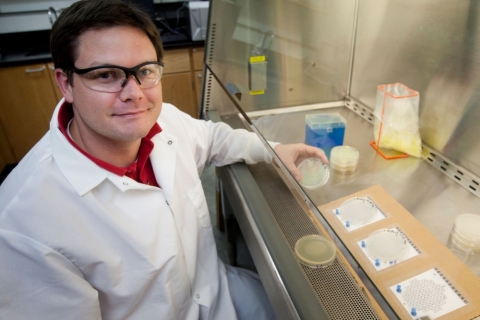
Date:
Location:
Speaker:
Abstract:
Finding a sustainable alternative for today’s petrochemical industry is a major challenge facing chemical engineers and society at large. To be sustainable, routes for converting carbon dioxide and light into organic compounds for use as both fuels and chemical building blocks must be identified, understood, and engineered. Advances in synthetic biology and other biological engineering disciplines have expanded the scope of what can be produced in a living organism. As in other engineering disciplines, synthetic biologists want to apply a general understanding of science (e.g. biology and biochemistry) to construct complex systems from well-characterized parts (e.g. DNA and protein). Once novel synthetic biological systems (e.g. enzymes for biofuel synthesis) are constructed, they must be engineered to function inside evolving cells without negatively impacting the host’s physiology. In most cases first generation systems fail to meet this goal. My group uses systems biology tools to identify metabolic, regulatory, and/or physiological barriers which often can be overcome with metabolic engineering strategies. One of the largest barriers to producing chemicals from biomass is the deconstruction step where sugar polymers are broken down into functional intermediates that can be consumed by engineered microbes. In this talk, I will present a novel, sustainable method of deconstructing biomass into fermentable sugars that does not require degradative enzymes as well as efforts to engineer photosynthetic bacteria to produce easy-to-process fermentation feedstocks. I will also describe work to develop strains of bacteria for producing chemical building blocks such as fatty acids, alpha-olefins, fatty alcohols, and bioplastics. Our work has combined functional genomics analysis, synthetic biology construction techniques, bioinformatics, and metabolic modeling to engineer superior microorganisms. We have tested our strains in media formulated with biomass sugars and are developing photosynthetic microorganisms to by-pass the biomass middle man and directly make products from carbon dioxide.
Bio Sketch:
Brian received his bachelor’s degree in Chemical Engineering from Cornell University in 2000. and earned his PhD in Chemical Engineering in 2005 from the University of California-Berkeley under the supervision of Jay Keasling. Brian was a postdoctoral fellow in the laboratory of David Sherman at the University of Michigan from 2005-2007. Brian is currently the Hunt-Hougen Associate Professor of Chemical and Biological Engineering with appointments in Biomedical Engineering, the Microbiology Doctoral Training Program, and the graduate program in Cell and Molecular Biology. Brian’s research has been recognized with young investigator awards from 3M, NSF (CAREER), DOE (Early Career), the Air Force Office of Scientific Research (AFOSR-YIP), Biotechnology and Bioengineering (Daniel IC Wang Award), the Society of Industrial Microbiology and Biotechnology and Purdue University (Mellichamp lectureship). Brian also received the Benjamin Smith Reynolds teaching award from the UW-Madison College of Engineering for his efforts to introduce undergraduates to biotechnology.



